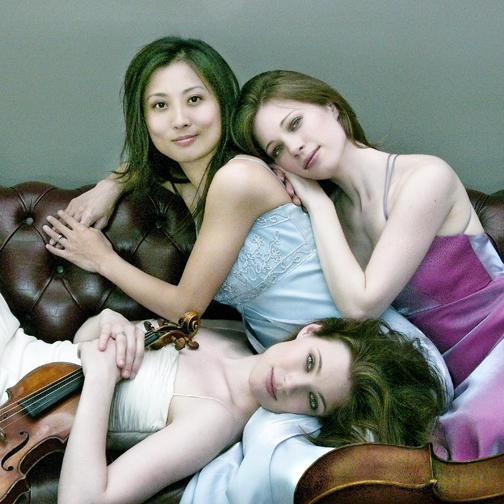Claremont Trio still shows need for greater polish and artistic maturity at Ravinia
Though the Claremont Trio has been receiving increasing attention in recent years due to their recordings, the glam, youthful-looking ensemble has been playing together now for 11 years.
The women (twins Emily and Julia Bruskin, and pianist Donna Kwong) appeared Tuesday night at Ravinia, shoehorned into an early-evening concert at Bennett-Gordon Hall while the masses assembled for the main rock event, Counting Crows, on the lawn.
I’ve had ambivalent reactions to the Claremont Trio’s recordings, appreciating the venturesome repertoire—notably on their most recent disc of American composers–while finding the performances technically uneven and light in terms of sonority and interpretive depth.
Tuesday’s program left me with the same mixed feelings. At times, the trio performed with sensitivity and poise while at other times, the playing failed to rise above the level one might expect from any proficient student ensemble.
I missed the first movement of the opening work, Schumann’s Piano Trio in F major, Op. 80, as did several others, due to traffic and a prolonged backup on Lake-Cook Road. (Is it really necessary to begin these concerts at 6 p.m. and force Chicago residents to battle rush hour to make the curtain?)
But in the three movements I heard, the Claremont Trio showed a shallow, somewhat miniaturized approach to music that calls out for greater thrust and vitality. Even though this is one of Schumann’s happier chamber works, the music clearly needs a bolder and more sophisticated palette, and the Claremont’s cautious tempo for the Allegretto made it seem like the work had two slow movements. Even with moderate tempos, there was repeated wayward intonation and scruffy playing from both violinist Emily Bruskin and cellist Julia Bruskin. Fewer rapturous facial expressions and more practice would be on point.
The group gets credit for providing a Ravinia premiere with Mario Castelnuevo-Tedesco’s Trio No. 2, Op. 70. Written in 1932, before the Jewish-Italian composer fled Mussolini’s Italy to seek refuge in the U.S., it shows a songful Italian heritage as well as the somewhat sticky lyricism that would prove useful when Castlenuovo-Tedesco later settled in Hollywood.
The playing of the opening movement had too soft a focus for music marked Schietto e deciso (“sincere and decisive”) suffering from the musicians’ facile style. The Claremont players proved more in their element in the central Romanza, with violinist Emily Bruskin’s sweet tone suiting the lilting main theme and some lovely playing in duetted passages with her cellist sibling.
Surprisingly, the Ravel Piano Trio came off best, and was clearly the most prepared performance of the evening. Pianist Kwong’s opening notes set just the right dreamlike atmosphere, and the ensemble’s delicate sonority suits the fragile, glassy passages of this work. Attacks were more incisive as well and though intonation throughout was not airtight, it was more consistent, with the Bruskin twins offering their best playing of the evening in the Passacaille.
The Spring section of Piazzolla’s Four Season of Buenos Aires was the lively encore to a decidedly mixed evening of chamber music.
Posted in Performances





